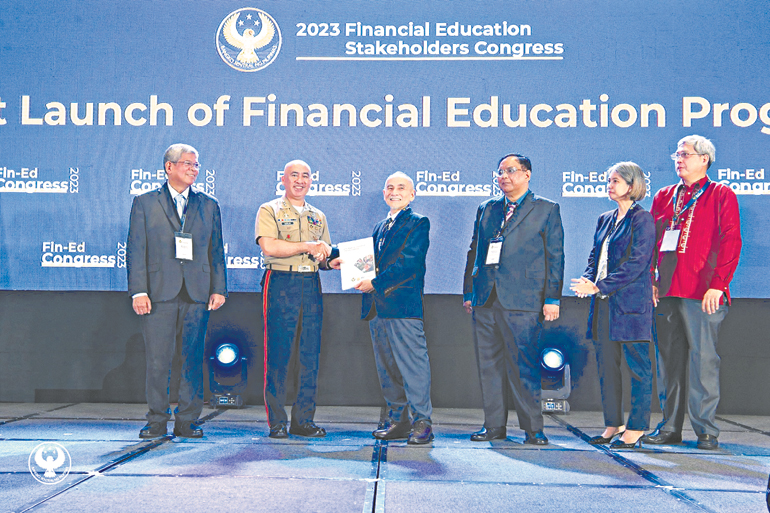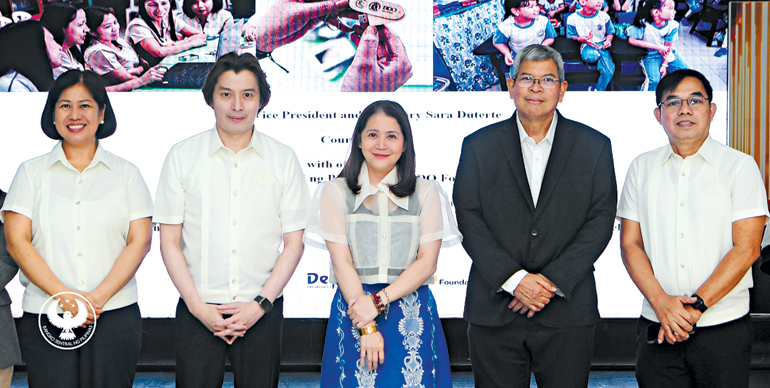BSP’s latest strides in educating and protecting consumers

Budgeting, saving, investing, managing debt, and understanding financial products are knowledge and skills essential in making individuals make informed financial decisions and improve their quality of life.
However, the Bangko Sentral ng Pilipinas’ (BSP) 2021 Financial Inclusion Survey shows that only two percent of Filipinos correctly answered all six basic financial literacy questions posed to them, while 69% correctly answered at least half. The central bank also revealed that the Philippines ranked in the bottom 30 of 144 countries, with only 25% of Filipino adults considered financially literate.
Mandated to undertake policies and initiatives aimed at financial inclusion and education of the general public, the BSP has been proactive in its advocacy to educate and protect Filipinos financially.
The BSP continues to promote awareness of critical economic and financial concepts through its several learning programs. The BSP established the Economic and Financial Learning Program (EFLP) to provide stakeholders with timely and apt learning activities. The EFLP includes bank-initiated and client-requested lectures from various schools, government agencies, private institutions, and other interested parties and collectively drew and engaged more than 120,000 participants.
The central bank also hosted an event last year that showcased the BSP and its institutional partners’ financial education advocacy milestones called the Financial Education Stakeholders Congress. Part of the congress were five online financial literacy and consumer protection learning sessions for the public which reached a total of 195,996 viewers via the Zoom and Facebook livestream platforms.
By producing bespoke financial education modules rolled out alongside the training sessions, the BSP conducted training-of-trainers (TOT) sessions for other government agencies as well.
The beneficiaries of these modules include: the Civil Service Institute (CSI) which conducted financial literacy sessions for 1,703 employees from various government agencies and 710 Civil Service Commission (CSC) employees; the Department of Migrant Workers (DMW) which facilitated the PiTaKa (Pinansyal na Talino at Kaalaman) financial literacy training to more than 2 million Overseas Filipino Workers (OFWs) before they went abroad; and the Department of Education (DepEd) which regularly holds personal financial management sessions for its teachers.
Last year, the BSP announced that financial education will also be included in the curriculum of the Technical Education and Skills Development Authority (TESDA) and the training of cadets from the Armed Forces of the Philippines. The e-learning program has an array of topics on managing finances such as budgeting and saving, investments, and debt management.

The central bank of the country has even made financial and economic education accessible to Filipinos by making educational resources and learning materials available online. Their website alone allows Filipinos to easily access financial topics from basic budgeting and saving tips to more complex subjects like investing and retirement planning.
Another online initiative by the BSP is their financial education simulation game called “Fish N’ Learn”. The game aims to capacitate over 1.9 million Filipino fishers nationwide and simulate real-life events that influence the financial behavior of fishermen and their families.
“Fish N’ Learn is meant to give our fisherfolk the primacy that they deserve by focusing on improving their financial health and overall quality of life, which helps to foster a financially healthy citizenry. Strong public-private partnerships are instrumental to achieve sustainable and scalable programs such as this one,” former BSP Governor Benjamin E. Diokno said.
Likewise, the central bank also launched the KITA (Kapital at Ipon Tungo sa Asenso) Mo Na! financial education game for agricultural workers, college students, and overseas Filipino workers (OFWs) last year.
To engage Filipinos on a much wider scale, the BSP has utilized social media through their PisoLit and EkoLit programs “to allow flexibility and agility in posting financial education content that fits the communication style of Filipino netizens.”
Available on Facebook, Instagram, and X, PisoLit posts are focused on topics and tips related to financial planning, saving, budgeting, managing debt, and investing while EkoLit helps improve consumers’ understanding of economic issues and concepts in the platforms. The materials posted in these accounts come in various formats, including infographics, short videos, and electronic learning tools offering valuable content to followers daily.
The central bank also has the duty to protect and advocate for the welfare of financial consumers. Under Republic Act No. 11765, the Financial Products and Services Consumer Protection Act (FCPA), the BSP was given the power to perform market conduct supervision and ensure financial consumer protection.
Through Circular No. 1169, Series of 2023, the BSP announced that the rules of procedure governing the consumer assistance mechanism (CAM) regarding complaints escalated to the central bank. The circular also clarified that BSP-supervised institutions (BSI) should establish its financial consumer protection assistance mechanism which will serve as the first level of recourse for aggrieved financial consumers.
Unresolved concerns in the first level will then be escalated to the BSP after being filed to the CAM for assistance facilitation. The mechanism, as the second level of recourse, acts as a venue for financial consumers and BSIs to communicate and resolve their issues.
Last year alone, the BSP received and processed over 43,000 new complaints from financial consumers through various CAM channels, about a 95.0% increase in volume from more than 22,000 complaints processed in the previous year.
The BSP also protects consumers by supervising the market conduct of BSIs. In partnership with the Cambridge SupTech Lab, the central bank created a prototype solution that can surf and analyze financial consumer sentiments across various social media platforms. Once fully operational, this prototype aims to alert the BSP of emerging financial consumer issues on social media and online news sites.
Additionally, the BSP implemented capacity-building programs for their officers by conducting two workshops with the World Bank where the two organizations were able to develop a Financial Consumer Protection and Market Conduct Supervision Framework. The framework aims to direct the central bank in conducting risk-based supervisory evaluations of BSIs’ business conduct and practices.
Through its accessible and comprehensive financial literacy programs, the BSP is addressing the crucial need for financial knowledge among Filipinos. With its robust consumer protection programs, the central bank ensures that consumers are well-protected and informed.
These initiatives show that the BSP has made significant steps not only in educating and protecting Filipino consumers financially but also in making their lives a little more livable. — Jomarc Angelo M. Corpuz



